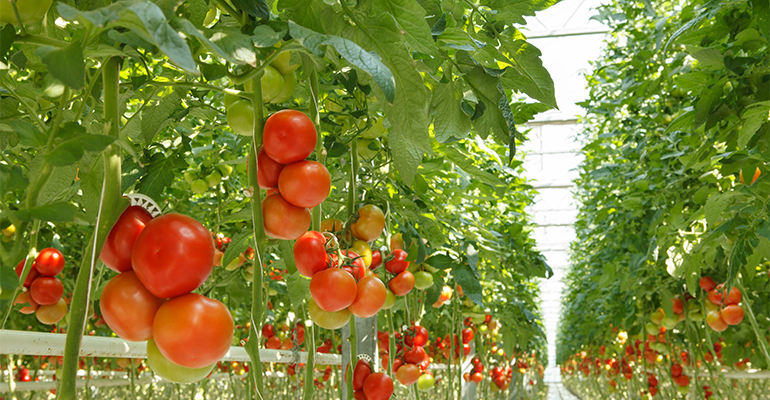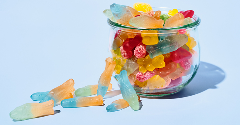News
World first: Dutch team develop method to extract high-value protein from tomato leaf
27 Jun 2022
Tomato leaves that are currently seen as a major waste stream in horticulture could provide a reliable and sustainable source of rubisco – a widespread plant protein that has potential in food and drink, say researchers.
Researchers at the Wageningen University & Research (WUR), the Netherlands, say they have become the first in the world to extract high-value rubisco protein from tomato leaves, one of the major co-streams of greenhouse horticulture.

“Our study proves that you can achieve substantial gains in sustainability by making better use of what you already have,” said project leader Marieke Bruins, a senior scientist in protein technology at WUR.
Rubisco: The next big alt-protein?
Rubisco (ribulose-1,5-biphosphate carboxylase oxygenase) is an enzyme crucial in photosynthesis, that is found in every leaf of every green plant in the world – often in considerable quantities.
In its pure form, rubisco has a neutral aroma, colour and flavour, a good balance of the essential amino acids, and good gelation properties, which make it an interesting prospect for development in the alt-protein space, noted the team in a recent press release.
Indeed, they noted that rubisco protein can be ‘very useful’ for processing into meat substitutes and dairy alternatives, since it can help to provide a firm ‘bite’ and improved mouthfeel.
In 2019, a study led by researchers from Wageningen Food & Biobased Research and the Nestlé Institute of Material Sciences, Switzerland, compared the functional properties of rubisco protein isolate – on this occasion isolated from sugar beet leaves – with commercial whey and soy protein isolates.
The study, concluded that rubisco had “comparable or superior functional properties to those of currently used whey and soy protein isolates”.
Writing at the time, the Wageningen-led team said the results highlighted the high potential of rubisco as a nutritious and functional food ingredient to face global food security and protein supply.
Method removes toxins from tomato leaves
The extraction of rubisco from tomato leaves uses similar methods to those developed by the WUR team for other crops and waste streams, including the method of extracting rubisco from sugar beet leaves.
However, Bruins and colleagues noted that the new method had to be adapted to remove the toxin hydroxytomatine from tomato leaves.
“Our method filters out the components that are smaller than the protein we want to extract, and this includes many toxins,” the lead researcher said.
The result of the extraction is a high-value protein powder, free of toxins, and ready to be used in food applications, the authors said, noting that the same method could also be suitable for extracting rubisco from the leaves of other food crops – such as potato or cassava, which, like tomato leaves, contain toxins that make them unsuitable for direct consumption.
Wanted: Private sector partners to scale up the ingredient
The team noted that harvesting food crops results in the yearly production of around 40 tonnes (for sugar beet) to 50 tonnes (for tomatoes) of crop residues, made up of leaves and stems, per hectare.
Traditionally, these residues are either ploughed back into the soil as fertiliser or are composted – both of which, the WUR team note, are low-value uses of the residues compared to extracting protein for human consumption.
Indeed, the researchers noted that the large-scale application of the process will increase the availability of plant-based proteins and contribute to a sustainable food supply for the growing global population.
They now hope to work with the private sector to further develop the technology to apply it on an industrial scale.
“That could mean working with greenhouse horticulture businesses, or businesses that use plant-based proteins as inputs. These might include producers of dairy and meat substitutes,” said Bruins.
Related news

Oat Barista: Innovation for game-changing beverages
20 Nov 2025
Oat Barista is a clean label, sustainable, and innovative drink base specifically designed to create the perfect foam in one single ingredient.
Read more
Nitrites: Pressure grows on UK to follow EU’s lead
20 Nov 2025
Pressure is growing on the UK to follow the EU’s lead after the bloc revised its regulations on the permitted levels of nitrites and nitrates in cured meats.
Read more
Empowering innovation in fortification and colouration
13 Nov 2025
Divi’s Nutraceuticals offers a large portfolio of innovative, high-quality ingredients for foods, beverages, and supplements, with bespoke solutions and expert support for product success.
Read more
Danone highlights digestive health as potential ‘tipping point’ for food industry
13 Nov 2025
Danone is betting on a food industry “tipping point” that will bloat the market for healthy products, particularly those related to gut health.
Read more
Standing Ovation and Bel scale up casein production from dairy co-products
11 Nov 2025
Foodtech company Standing Ovation has partnered with cheese specialist Bel Group to manufacture dairy serums for industrial-scale casein production via precision fermentation.
Read more
AI attraction means foodtech startups must ‘prove’ rather than ‘promise’
4 Nov 2025
Reports suggest that artificial intelligence (AI) is sucking investment from foodtech and agritech, but investors say the picture is complicated.
Read more
Will postbiotics become the go-to functional ingredient?
3 Nov 2025
Postbiotics show significant promise for the functional foods market due to their safety profile and beneficial bioactive properties, research suggests.
Read more
Meet the finalists of the Fi Europe Innovation Awards 2025
31 Oct 2025
Who made it to the shortlist of the Fi Europe Innovation Awards 2025? Read about the 23 companies making food and drink products healthier and manufacturing processes more efficient.
Read more
Penguin and Club bars no longer classed as chocolate
30 Oct 2025
Penguin and Club bars can no longer be classified as chocolate after the pladis-owned McVitie’s brands turned to cheaper alternatives amid the ongoing cocoa crisis.
Read more
Shorter drying time, sweeter success!
30 Oct 2025
Curious about cost-effective, sustainable and delicious candy making? Stefan Wessel reveals how Avebe’s solutions reduce drying time and energy use by up to 50%.
Read more